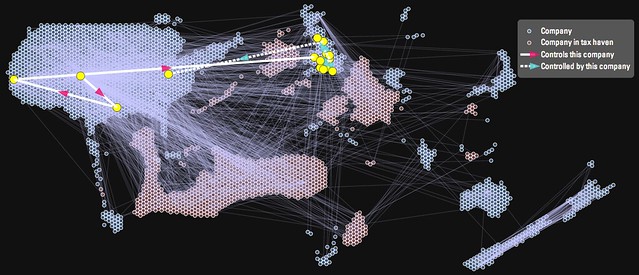In the coming months many governments around the world will decide whether databases of who really owns and controls companies should be made public or not.
As we’ve said before, we think registers of ‘beneficial ownership‘ (i.e. registers of who really stands to benefit from company ownership, not just whomever it is convenient or expedient to list) should be published as open data.
We call on open data and transparency advocates around the world to join us in asking their governments to take action on this issue, and to push for concrete commitments to publish registries of beneficial ownership publicly, as open, machine readable databases.

Who gets to see who really owns companies?
In June G8 countries committed to cracking down on hidden company ownership.
The Lough Erne Declaration and principles to prevent the misuse of companies from the G8 both allude to better information sharing between tax authorities, and state that tax collectors, law enforcers, financial intelligence units, and financial institutions should be able to access information on who really owns companies.
But what about the rest of us? Shouldn’t journalists, campaigners and citizens have access to information about who really owns companies – in order to investigate illicit and unfair behaviour and to push for change?
The advantages of public registries
We think that there are many advantages to having public registries of beneficial ownership information.
Firstly, public registries would enable the media and civil society to hold companies to account – by helping them to identify corruption and illicit activity.
Secondly, studies by the UK, the EU and Global Witness suggest that public registries would be significantly more cost effective than the status quo.
Thirdly, public registries will impose no additional administrative burden on companies – entailing only small modifications to existing processes.
Making them public is not enough – they must be published as open data
For registries of beneficial ownership to have maximum impact, we think it is essential that they are published as machine readable open databases.
Users of the data must be able to analyse the data and to easily cross reference and combine datasets from different sources. Hence it is essential that they are machine readable, and available for downloading in bulk (as per the Open Definition), rather than published as non-machine-readable documents or through a search interface which limits querying.
Furthermore the data should be openly licensed to enable people to use it, republish it, and combine it with other datasets. We think is essential if we are to gradually piece together a shared, collaborative ecosystem of data about companies and their activity around the world.
Now is time to act
There are several major opportunities to make progress on this issue in the coming months:
- The UK currently has an open consultation on beneficial ownership (closing 16th September 2013), which explicitly asks for views on whether the registry should be made public. If you’re in the UK and want to see the registry being made public as open data, we strongly encourage you to respond with arguments and evidence about why this matters. If the UK commits to making registries public, then it is much more likely that other countries will follow.
- The EU is also in the process of updating and improving its Anti Money Laundering Directive, which represents a major opportunity to increase transparency of beneficial ownership in Europe.
- For the Open Government Partnership partner countries, the Open Government Partnership Summit this autumn will provide an opportune moment for governments to announce their commitments to public registries of beneficial ownership. We hope to see as many governments and civil society organisations as possible coming out in support of public registries, published in accordance with open data principles.
You’ll be hearing more from us on this issue in the coming weeks and months, so watch this space! If you’re interested in discussing this with us, you can join our public openspending list.
Dr. Jonathan Gray is Lecturer in Critical Infrastructure Studies at the Department of Digital Humanities, King’s College London, where he is currently writing a book on data worlds. He is also Cofounder of the Public Data Lab; and Research Associate at the Digital Methods Initiative (University of Amsterdam) and the médialab (Sciences Po, Paris). More about his work can be found at jonathangray.org and he tweets at @jwyg.









2 thoughts on “Beneficial ownership registries should be published as open data”
Comments are closed.